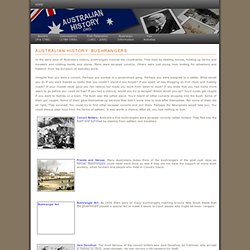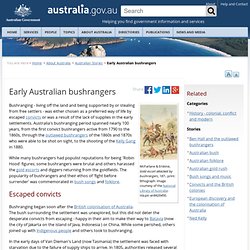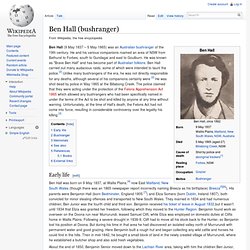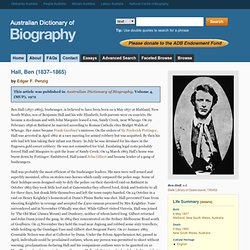

Bushrangers. Australian Bushrangers: Were Australia's bushrangers worse felons than the UK's highwaymen and the USA's wild west outlaws? Australian Bushrangers. The Australian Bushrangers. The Australian Bushrangers Who, What, When, Where Why?

The term “Bushranger” has definitely changed over the years. In the very early years, it simply referred to good bush men who possessed the horsemanship, hunting, and survival skills needed for living in the Australian bush, or wild, after they fled Australia’s prison colonies. Now, the term is used to refer to criminals who attacked travelers on the road in the bush. It’s impossible to say just how many bushrangers walked Australia’s bush, although there had to be hundreds. Australia was originally colonized largely by English criminals. Gold Rush The second major contributing factor to bushranging was the Victorian Gold rush that occurred in the 1850s and 1860s.
Dress Bushrangers typically dressed in very cheap, rough clothes. Famous Bushrangers Other resources: Activities: Different Australian history and activities, including bushwalker activities. Related Categories. Ancient Australian History. In the early days of Australia’s history, bushrangers roamed the countryside.

They lived by stealing horses, holding up farms and travelers and robbing banks and stores. Many were escaped convicts. Others were just young men looking for adventure and freedom from the boredom of everyday work. Imagine that you were a convict. Perhaps you worked in a government gang. Convict Bolters: Australia's first bushrangers were escaped convicts called 'bolters' They fled into the bush and survived by stealing from settlers and travellers. Friends and Heroes: Many Australians today think of the bushrangers of the gold rush days as heroes. Bushranger Act: By 1830 there were so many bushrangers roaming around New South Wales that the government passed a special Act to make it easier to catch people who might be bush- rangers. Early Australian bushrangers. McFarlane & Erskine, Gold escort attacked by bushrangers, 187-, print: lithograph.

Image courtesy of the : nla.pic-an8420450. Bushranging - living off the land and being supported by or stealing from free settlers - was either chosen as a preferred way of life by escaped or was a result of the lack of supplies in the early settlements. Australia's bushranging period spanned nearly 100 years, from the first convict bushrangers active from 1790 to the 1860s, through the of the 1860s and 1870s who were able to be shot on sight, to the shooting of the in 1880. While many bushrangers had populist reputations for being 'Robin Hood' figures; some bushrangers were brutal and others harassed the and diggers returning from the goldfields.
The popularity of bushrangers and their ethos of 'fight before surrender' was commemorated in and . Australian Crimes - BUSHRANGERS. Ben Hall (bushranger) Ben Hall (9 May 1837 – 5 May 1865) was an Australian bushranger of the 19th century.

He and his various companions roamed an area of NSW from Bathurst to Forbes, south to Gundagai and east to Goulburn. He was known as "Brave Ben Hall" and has become part of Australian folklore. Ben Hall carried out many audacious raids, some of which were intended to taunt the police.[2] Unlike many bushrangers of the era, he was not directly responsible for any deaths, although several of his companions certainly were [2] He was shot dead by police in May 1865 at the Billabong Creek.
The police claimed that they were acting under the protection of the Felons Apprehension Act 1865 which allowed any bushrangers who had been specifically named in under the terms of the Act to be shot and killed by anyone at any time without warning. Unfortunately, at the time of Hall's death, the Felons Act had not come into force, resulting in considerable controversy over the legality his killing.[3] Death of Ben Hall. Ben Hall. Ben Hall (1837-1865), bushranger, is believed to have been born on 9 May 1837 at Maitland, New South Wales, son of Benjamin Hall and his wife Elizabeth; both parents were ex-convicts.

He became a stockman and with John Macguire leased a run, Sandy Creek, near Wheogo. On 29 February 1856 at Bathurst he married according to Roman Catholic rites Bridget Walsh of Wheogo. Her sister became Frank Gardiner's mistress. On the orders of Sir Frederick Pottinger, Hall was arrested in April 1862 at a race meeting for armed robbery but was acquitted.